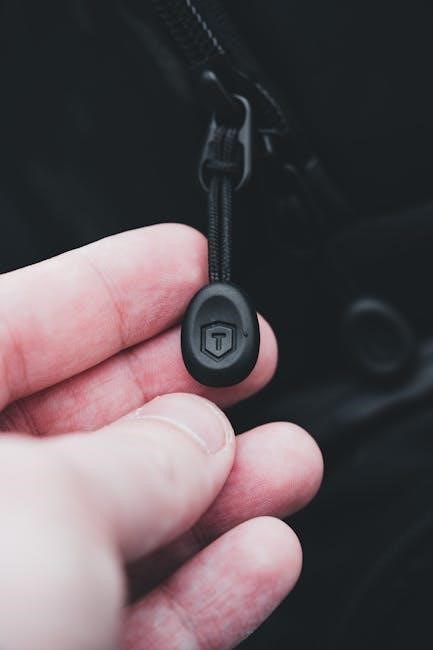FTC (FIRST Tech Challenge) inspires students in STEM through robotics competitions․ The Game Manual Part 1 provides essential rules, structure, and guidelines for the competition, ensuring fairness and consistency across traditional and remote play formats․ Teams must adhere to these standards for robot design, field setup, and scoring to ensure a smooth and competitive experience․
Overview of FIRST Tech Challenge (FTC)
FTC is a student-centered program by FIRST, inspiring interest in STEM through robotics․ It engages students in grades 7-12 in designing, building, and operating robots for competitions․ Teams collaborate, fostering teamwork, innovation, and problem-solving skills․ FTC emphasizes hands-on learning and community support, preparing students for STEM careers while encouraging sportsmanship and creativity․ The program is global, with teams competing locally and internationally․ FTC provides a platform for students to develop technical and interpersonal skills, supported by mentors and industry professionals․ It aims to create a diverse, inclusive environment where students thrive and build confidence for future challenges․
Purpose of the Game Manual Part 1
Game Manual Part 1 serves as the primary guide for FTC teams, outlining rules, robot requirements, and competition procedures․ It ensures consistency and fairness, detailing traditional and remote play rules․ The manual is regularly updated, with Version 1․3 released on November 15, 2023, reflecting current standards․ Teams must adhere to its guidelines for robot design, field setup, and scoring․ It also covers safety protocols, conduct expectations, and technical specifications, ensuring all participants are well-prepared․ The manual is essential for teams to understand competition expectations and comply with regulations, fostering a competitive yet structured environment for all․

Structure of the FTC Game Manual Part 1
Game Manual Part 1 is divided into key sections, including robot requirements, field setup, traditional vs․ remote play rules, and safety protocols, ensuring clarity and accessibility for all teams․
Key Sections and Updates in the Manual
The FTC Game Manual Part 1 includes vital sections such as robot specifications, field configurations, and scoring details․ Recent updates in the November 15, 2023 release clarify rules for traditional and remote play․ These updates ensure compatibility with approved programming tools like FTC Blocks and Android Studio․ Additionally, the manual outlines software and hardware requirements, ensuring teams comply with competition standards․ Teams must stay updated with these changes to maintain eligibility and competitiveness in the upcoming season․
Traditional vs․ Remote Play Rules
The FTC Game Manual Part 1 distinguishes between traditional and remote play rules to accommodate different competition formats․ Traditional play involves in-person matches with physical robots on a standard field, adhering to specific robot dimensions and interaction rules․ Remote play, introduced for flexibility, allows virtual competitions, with teams operating robots remotely or using simulations․ Both formats share core objectives but differ in execution․ The manual ensures fair competition by detailing requirements for field setup, robot operation, and scoring in traditional play, while outlining software, connectivity, and remote judging processes for remote play․ These distinctions ensure consistency and fairness across all competition environments․

Core Rules and Regulations
Core rules regulate robot design, safety protocols, and field setup, ensuring fair competition․ They outline prohibited components, match conduct, and scoring systems for all participants․
Robot Requirements and Restrictions
Robots must adhere to size, weight, and material constraints specified in the FTC Game Manual Part 1․ They must be designed using approved components and avoid prohibited materials․ Teams are required to use FTC-approved programming tools like FTC Blocks or Android Studio for robot control․ Robots must operate autonomously during matches and cannot exceed specified dimensions or weight limits․ All robots are subject to pre-match inspections to ensure compliance with safety and technical standards․ Failure to meet these requirements may result in disqualification or penalties during competition․

Field Setup and Scoring Elements
The FTC field is carefully designed with specific zones, goals, and markers to facilitate gameplay․ Teams must set up the field according to the manual’s precise dimensions and layout․ Scoring elements include points awarded for placing game pieces in designated areas․ The field setup ensures fair competition, with clear guidelines for both traditional and remote play formats․ Teams are required to use official FTC field kits or replicate the setup accurately․ The scoring system is detailed in the manual, outlining point values for various actions during matches․ Proper field setup and adherence to scoring rules are crucial for accurate match outcomes and fair competition․

Programming and Technical Guidelines
FTC Blocks and Android Studio are approved tools for programming robots․ Teams must follow technical guidelines to ensure compatibility and compliance with competition rules and standards․
Approved Programming Tools (e․g․, FTC Blocks, Android Studio)
FTC Blocks is a visual, blocks-based programming tool designed for beginner-friendly robot control, while Android Studio offers a more advanced, text-based environment for complex robot operations․ Both tools are officially approved by FIRST Tech Challenge for competition use․ FTC Blocks simplifies programming with drag-and-drop functionality, making it accessible for new teams․ Android Studio, on the other hand, provides flexibility and customization for experienced teams․ Teams must ensure their chosen tool aligns with FTC compatibility standards to avoid penalties․ Adherence to these guidelines ensures fair competition and seamless integration with FTC’s scoring and operational systems․
Software and Hardware Compatibility
Ensuring software and hardware compatibility is crucial for FTC competition success․ Teams must use FTC-approved programming tools like FTC Blocks or Android Studio, which are compatible with Android-based robot controllers․ Hardware components, such as motors and sensors, must meet FTC specifications to guarantee seamless integration․ Additionally, devices like laptops or tablets used for programming must run compatible operating systems and have necessary software updates․ Compatibility checks are essential to avoid technical issues during competitions․ Teams should refer to the FTC Game Manual Part 1 for detailed requirements and updates to ensure their systems meet all standards for a smooth competition experience․

Team Management and Eligibility
Team management involves ensuring eligibility criteria are met, including age restrictions and adult mentorship requirements․ Teams must comply with FTC rules to participate effectively in competitions․
Team Composition and Eligibility Criteria
Teams in FTC must consist of students aged 12-18, with at least two members but no more than 15․ Each team requires adult mentorship but must be student-led․ Eligibility includes adherence to FIRST’s policies, ensuring no professional engineers are involved in robot design or construction․ Teams must also maintain a notebook documenting their engineering process, which is evaluated during competitions․ Additionally, all participants must agree to the FIRST Code of Conduct, emphasizing respect and sportsmanship․ Compliance with these criteria ensures fair competition and aligns with FTC’s mission to foster STEM education through teamwork and innovation․
Event Registration and Judging Process
Teams must register for FTC events through the official FIRST portal, ensuring all eligibility criteria are met․ Registration includes submitting team and member information, payment, and compliance with deadlines․ The judging process evaluates teams based on robot performance, engineering design, teamwork, and community impact․ Judges review notebooks, conduct interviews, and observe pit displays to assess creativity and adherence to FTC principles․ Teams are awarded for excellence in categories like Innovation, Design, and Motivation․ The judging process ensures a fair and comprehensive evaluation of each team’s skills, dedication, and understanding of the competition’s objectives․

Safety and Conduct
Safety protocols ensure proper gear and emergency preparedness․ The code of conduct promotes respect, fairness, and sportsmanship, fostering a positive environment for all competitors․
Safety Protocols for Teams and Competitors
Safety is a top priority in FTC competitions․ Teams must ensure all members wear appropriate personal protective equipment (PPE) during robot construction and operation․ Proper handling of tools and materials is mandatory to prevent injuries․ Emergency procedures, such as fire evacuation plans and first aid kits, must be in place at all events․ The pit area should remain organized to avoid tripping hazards․ Teams are also required to follow venue-specific safety rules and guidelines outlined in the Game Manual Part 1․ Failure to comply with safety protocols may result in penalties or disqualification, emphasizing the importance of adherence for a safe and enjoyable competition environment․

Code of Conduct and Sportsmanship
The FTC Game Manual Part 1 emphasizes the importance of maintaining a positive and respectful environment․ Teams and competitors must adhere to a strict code of conduct, promoting sportsmanship and ethical behavior․ This includes treating others with respect, refraining from harassment or bullying, and avoiding any form of unsportsmanlike conduct․ Teams are expected to follow all rules and instructions provided by event staff and volunteers․ Any violations of the code of conduct may result in penalties or disqualification․ The focus is on fostering collaboration, innovation, and mutual respect among all participants, ensuring a fair and enjoyable experience for everyone involved in the competition․

Additional Resources and Support
FTC offers archived manuals, updates, and official Q&A forums for teams․ These resources provide clarification and support, ensuring teams stay informed and compliant with competition rules․
Accessing Archived Manuals and Updates
Archived FTC Game Manuals are available on the FIRST website, providing historical rules and updates․ Teams can access previous seasons’ manuals to review changes and understand rule evolutions․ Regular updates ensure clarity and fairness, with the latest versions, like the November 15, 2023, release, addressing key adjustments․ Accessing these resources helps teams stay informed and adapt to the current season’s requirements effectively․
Official Q&A Forums and Support Channels
Official Q&A forums provide a centralized platform for teams to clarify rules and resolve doubts․ These forums are monitored by FTC officials, ensuring accurate interpretations of the game manual․ Teams can submit questions directly, fostering transparency and fairness․ Additional support channels include the FTC website, which hosts resources like archived manuals and updates․ The FTC Scoring System also offers tools for match scoring and remote participation․ These channels help teams stay informed, adapt to updates, and ensure compliance with competition rules, fostering a competitive and equitable environment for all participants․
